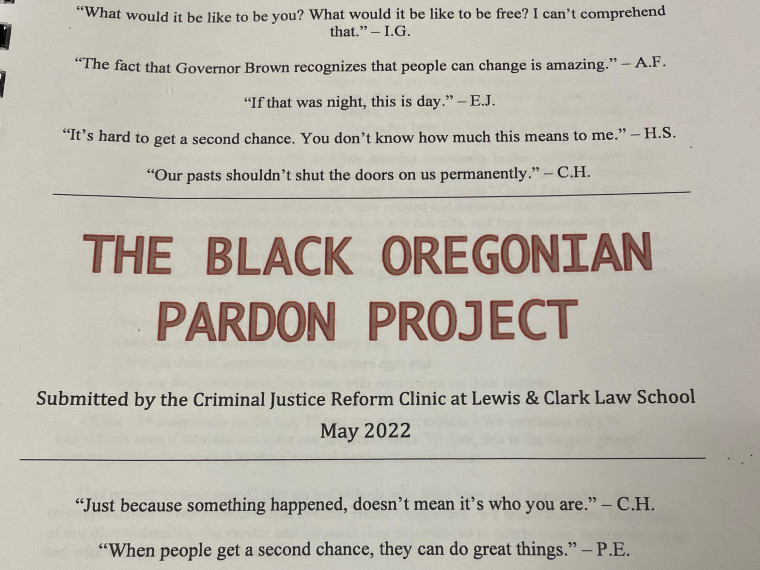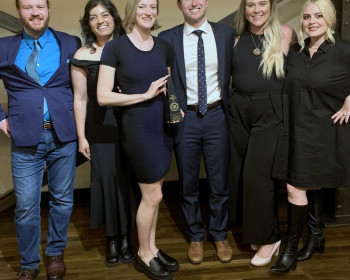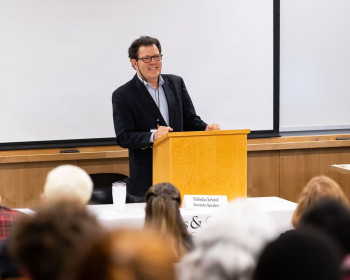Students & alum reflect on the Black Oregonian Pardon Project
Open gallery

The Criminal Justice Reform Clinic (CJRC) provides law students an opportunity to get hands-on experience with criminal justice issues in Oregon. One example of this is the CJRC’s recent Black Oregonian Pardon Project. The year long project identifies and represents people who were released from prison at least 10 years ago, have had no incidents since being released, have a non-expungeable felony conviction that is holding them back in life, and are “living their best life,” according to Professor Aliza Kaplan, Director of CJRC.
For this project, CJRC partnered with community ambassadors (who are former clients of CJRC) that have had their past convictions pardoned by Governor Brown. The ambassadors worked in the community to refer people who need legal representation to CJRC. CJRC students then confirmed the potential clients’ interest in receiving a pardon and ensured that they met the criteria for the project.
Once the qualifying criteria was met, CJRC students interviewed the clients to learn more about their lives, including their jobs, their involvement with their families and their community. This information was vital as students drafted clemency petitions to Governor Brown that describe how clients have turned their lives around and how a pardon would help them continue to achieve more in their lives. If granted a pardon, prior felony convictions will not show up in background checks, which makes it easier for clients to get jobs or housing and allow them to be more involved in their communities.
The pardon process is nearly impossible without legal help, which is why CJRC’s work is so important. The Black Oregonian Pardon Project work has resulted in 72 individual pardon cases which went to the Governor at the end of May. “This project has been meaningful in so many ways. The idea came directly from our past clients because they understand directly the huge interest and need for people to clear their records of very old convictions that are creating barriers to moving forward. It has allowed us to meet incredibly resilient people and tell their important stories. It has also been a real history lesson for all of us about Oregon’s Black communities, specifically Portland in the 1980s and 1990s. The project not only provided amazing opportunities for the students to use their lawyering skills, but also allowed them to work directly in the community and see how lawyers can use their skills to help change the course of people’s lives,” said Professor Kaplan.
Project students commented on their involvement. Caroline Shen ’23, emphasized the lasting significance of a pardon for clients. “Many clients were convicted when they were young adults and have had to deal with the impacts of having an ex-felon identity as well as the stigma that comes with that identity.”
For Mark Cebert ’22, the project confirmed that he wants to “work to legally empower marginalized communities” and hopes to do so through direct representation, lobbying, and research.
For Sara Long ’22, the project opened her eyes to the “hope and resilience of people” and the disproportionate impact of the justice system on communities of color. She emphasized that meeting the ambassadors and hearing them talk about their own experiences and the effects on their communities “drove it home” for her in a way that she hadn’t experienced before. Sara recounted how the ambassadors discussed their “communities’ frequency of contact with law enforcement, generations of families incarcerated, and the perpetuation of poverty in vivid, personal detail.” Listening to the clients share their vulnerabilities, harms that they had both suffered and inflicted, taught Sara what it means to forgive, and she is especially moved to see many of the clients rejoice in their lives now.
Brittany Hill ’19 is a former student of CJRC who works as the staff attorney for the Pardon Project. She was a clinic student during her 2L year at Lewis & Clark and was thrilled at the opportunity to “come home” to CJRC and work on the Pardon Project. When asked about the Project, she replied that it “has been such an honor and a joy to work on.” The biggest takeaways for her have been “the amazing clients” and the fact that “a pardon will not only change their lives but signal to their community that this is possible. They know this will inspire others and give them hope. That’s incredibly powerful.” Hill is grateful to Professor Kaplan and the project ambassadors for creating this project that has allowed her to change people’s lives for the better. Hill knows that she will remember this “experience for her entire legal career.”
When asked about how this project has shaped them, as well as any advice they have for students considering working with CJRC, all the students emphasized how rewarding the experience has been for them. Mark appreciated how the clinic as a whole equips students with the hands-on experience they will need to be prepared to go into the “real world” of lawyering. Sara emphasized that this project has shown her how to use her privilege for good, and also the importance of listening, asking questions, and showing compassion instead of “pretending to have lived someone else’s experience.” Brittany concluded that there “is no better place than the Criminal Justice Reform Clinic to learn about criminal justice reform issues and get hands-on experience.”
Law Communications is located in room 304 of Legal Research Center (LRC) on the law Campus.
MSC: 51
email jasbury@lclark.edu
voice 503-768-6605
Cell: 626-676-7923
Assistant Dean,
Communications and External Relations, Law School
Judy Asbury
Law Communications
Lewis & Clark Law School
10101 S. Terwilliger Boulevard MSC 51
Portland OR 97219

